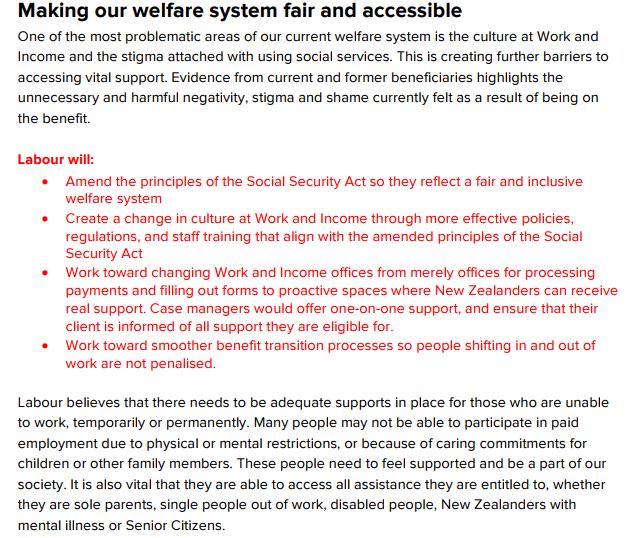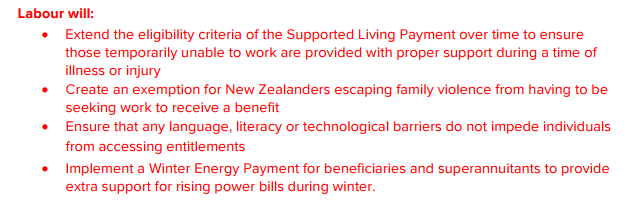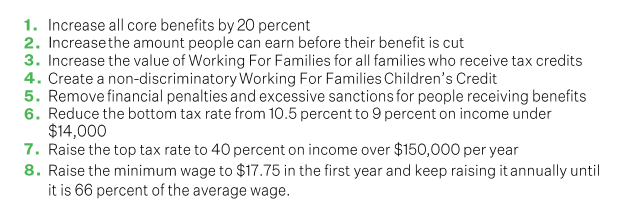My application for the Supported Living Payment has been approved.
Before I say anything else, I just want to thank everyone who encouraged and supported me through this process. I probably wouldn’t have even applied if I hadn’t had that gentle push and the reassurances that this was my entitlement. So, thank you. You made all the difference.
This week, I received the news that my application for the SLP was approved. I couldn’t quite believe what I was hearing, and have been in some sort of shock for a few days.
I want to stress that this something I applied for a week ago. I actually applied two years ago and was turned down, even though I qualified. Even before that, I qualified. Like many chronically ill and disabled people, I was inappropriately moved to the Jobseeker Benefit when the Sickness Benefit was abolished as part of the welfare reforms in 2013. At that time, the Invalid’s Benefit was renamed the Supported Living Payment. I didn’t apply for it then because I was trying to stay employed, and I had no idea how sick I was going to get, and for how long. I hadn’t yet been diagnosed with Ankylosing Spondylitis. Even when that happened, I kept fighting an internal battle about “giving in” to my illness. I’m still fighting that – but I have finally accepted that it’s not going away, and I need and deserve more support. I’m in shock that WINZ has agreed.
I’ve been putting off writing this, because I didn’t know what to say, or how to feel. I expected to be happy and relieved, and I am. This is a huge change for me, and something I really needed. It’s not just about the money, though obviously that’s important. It’s about WINZ acknowledging that I’m not unemployed – I’m sick. And I’m not getting better any time soon.
I think it’s that last bit that is tripping me up. Because for WINZ to acknowledge that I’m sick – and we all know it is not easy to reach that point – it must mean I’m really, actually sick.
I know – newsflash, right? But the thing is, I have never accepted my illness, or more accurately, I have never accepted its longevity.
The Supported Living Payment is only approved for conditions that are ‘permanent.’ Your doctor has to say that they don’t expect your health to improve within the next two years.
Both my GP and my rheumatologist wrote letters detailing all the things they, and I, have done – up to and including chemotherapy – to try and get well, and stating in no uncertain terms that everything has failed. They were quite forceful, which I really appreciated. But it was still really hard to see all of that in black and white.
What it means now is that I won’t have to provide new medical certificates every three months, I won’t have to reapply for the benefit every twelve months, and I won’t be expected to be looking for work. All of which is a massive relief.
But it’s also, for lack of a better word, a total mindfuck.
When I say I have never accepted my illness, what I mean is, I have never stopped believing that tomorrow – and I do mean literally tomorrow – I will wake up and be better. There is something in my brain that cannot comprehend that the way I feel isn’t temporary. I don’t know if it’s stubbornness or if it’s some sort of weird unconscious protection mechanism. Maybe I’ve internalised the stigma about “faking” invisible illnesses so much that I literally don’t believe myself.
I understand my condition. I understand that I have thought I would get better tomorrow for close to six years, now. It has not happened. I can see – on paper, even – that it is very unlikely to happen.
When I first started getting ill, I worked myself into the ground, because I truly believed my symptoms were temporary, and the thought of going on a benefit was horrifying to me. I had internalised a lot of beneficiary stigma along with the invisible illness stuff, and I thought that getting a benefit would be me giving up. I am a fiercely independent person. I believe in working to support myself, in the traditional 9-5 way. I thought that I had learned to think differently, but the move to the SLP has shown me that I have not.
I feel guilty. I feel undeserving. I feel bad for all the people I know who should also have access to the SLP but don’t, for whatever reason.
I feel like I need to work harder at all the unpaid labour I do in order to justify getting this support. Which is ridiculous, because that will only make me more sick, and because this support is my entitlement as a sick person, regardless of what I can achieve. But I have never recovered from my workaholism. I have never made the transition to a headspace where I identify as a disabled person who does not work. Even at my worst, I have remained committed to achieving things. I remember clearly being in hospital and answering my phone, lying that I was at my desk at work. A desk I no longer had.
It’s almost pathological, this commitment. And it’s clearly unhealthy.
Partly because of my memory loss, I recently started writing down everything I do each day – whether it be writing, going to medical appointments, doing my physio exercises, reading and researching, supporting others, running my household. I was shocked by the length of the list. It turns out I do a lot more than I think. It’s just that most of it doesn’t have an obvious monetary value, and so I discount it.
I’m going to try and stop doing that. Everything I do has value. Everything I do is “work” of its own kind.
And even if I were not able to do any of it, I would still be entitled to financial support. That is my right, as a human, in our democracy. I am sick. That is my reality.
Accepting that is the next step. For me, it’s a thin line between a place of acceptance, where I don’t push myself and hurt myself unnecessarily, and a place where I give up. Because while I need to accept that I’m not going to wake up tomorrow suddenly cured, I do not accept I’m never getting well. I continue to picture a future where my illness goes into remission and I can do all the things that are currently inaccessible to me. I don’t think it’s possible for me to let that image go, and I don’t want to.
But in the meantime, WINZ has endorsed the ‘permanent’ aspect of my disability. I don’t have to keep proving it over and over.
Thank you again, to everyone who encouraged me in this, to everyone who encourages me in all the things I do. I see you and there’s not enough words to describe what it means.I hope I can continue to provide in return.
EDIT:
I can’t help but add some politics in here. I wrote last month about Labour’s welfare policy, which has some of the right words but is overall a bit woeful.


The idea to extend the SLP to those temporarily unable to work because of illness or injury doesn’t address the rift that happened when the Unemployment Benefit and the Sickness Benefit were rolled together into Jobseeker Support. The SLP, formerly the Invalid’s Benefit, is meant to be for for those with ‘permanent’ (defined by WINZ as two years or more, which is weird, but whatever) conditions. The support offered within the SLP (the base rate, as well as the Disability Allowance and other additional measures) reflects that permanent status.
It would make a lot more sense to reinstate the Sickness Benefit, or create a new one, that sits between the Jobseeker and SLP. I would have been happy to classified that way, for these past five years. All this time, I’ve been subject to the same requirements as an unemployed person – to be looking for and available for work, and if I couldn’t do so, to provide medical certificates every three months as proof my incurable illness hadn’t miraculously disappeared. I would really like to see other people saved that stress. It never made sense to me that people who are looking for work, and people who have chronic illnesses, were lumped together. It also doesn’t really make sense for people who are experiencing a temporary illness or a broken leg, to be under the same banner as people with a permanent disability.
I’m not a politician. I don’t know half of what I’d like to know about policy making. I’m sure there is a reason Labour have proposed an extension of an existing benefit, rather than creation of a new one that would actually be fit for purpose. It probably has something to do with paperwork and cost saving. However, the SLP is a higher base rate than Jobseeker, which I assume is to reflect medical costs etc. So putting more people on the SLP will cost more.
I was recently asked what things I would like “middle New Zealand” to know about our welfare system. These are my top three things. I have gone on about them endlessly, and I will continue to do so.
- All benefits are taxed, at the “M” rate. Therefore, beneficiaries are taxpayers. We need to stop with this false dichotomy of people on welfare living off working people’s tax dollars.
- Working when you are on a benefit is discouraging, because a) For every dollar you earn over $80, your benefit is reduced by 70 cents. (This is for someone on Jobseeker with no children, others can earn more). So, if you earn $100, you lose $14 off your benefit. b) That work is subject to secondary tax, which could be anywhere from 10-33%. So say you earn $100, and get taxed at 10%, and your benefit is reduced by $14, that’s $24. You end up with $76. Don’t get me wrong. I am happy to pay tax. I am happy to have education and infrastructure and a welfare system, obviously. But it gets kind of discouraging – the more you try to get ahead, the more you’re penalised. And we want people on benefits to do work if they’re able, don’t we? But this doesn’t make it easy.
- You cannot save. Any money you have in the bank is considered an asset, and you could get your benefit stopped. So you can’t put anything away for a rainy day or a tax bill or your kid’s education (which is really hard if you’re self-employed, for example, and you want to put money away for your end-of-year tax/ACC bills). You’re encouraged instead to get a loan, which drives people into debt and then they need even more support. A friend of mine is currently six months pregnant and has had Hyperemesis Gravidarium her whole pregnancy. She’s really struggling to work – but WINZ wouldn’t help because she has money saved to pay her tax bill next month. She tried to explain that the money already belongs to IRD, but it made no difference.
I want people to know that beneficiaries are not “terrible with money” and “don’t want to work”. These three things above make it really fucking difficult to be good with money (or to have it at all).
The Greens had some good election promises, but even these don’t go far enough and they’re not fleshed out.

I know that NZ First will throw up barriers to any policy change Labour tries to make. Labour is in a really difficult position, because the main thing to change isn’t actually policy – it’s culture. We have a culture of beneficiary hatred in New Zealand – yes, it’s hatred. I’ve experienced it first hand. Increasing benefit rates is a plaster over the gaping wound. Until we can address and rewrite the public narrative around welfare and welfare recipients, we won’t be able to implement the policy we need to effect widespread systemic change.
I’m really hoping that now is the start of something new.

I’m so pleased for you. I don’t think anyone ever gets over the hope their “enemy” will go away either permanently or temporarily but reality is we have to play the hand dealt as best we can,some days better than others but keep on playing. Anyway YAY for you 🙂
Thanks so much Rochelle. I guess you’re right. We play the hand we’re dealt, we keep on playing and we keep on hoping. x
awesome news
Thank you Kate! x
So pleased – the long slog to continually prove your entitlement is so counter-productive. Hopefully the energy and emotional resources you’ve had to invest in that will turn into more great writing and, more importantly, your ability to do cool stuff.
Another thing that would help improve the stigma surrounding beneficiaries is to either prosecute tax evasion at the same threshold, or raise the threshold for prosecution for benefit fraud to where IRD sets their threshold. It gives people a skewed perception that beneficiaries are a massive problem to tax payers when in reality it’s a mere fraction of the problem compared to tax evasion.
I’m glad you finally got accepted for the SLP.
Something I’ve discovered with my own chronic illness is that there is a period of grief because the person who you were is gone. You’re still here but you’re not the same anymore; even if you were miraculously healed tomorrow you would still be different because you see the world with a different perspective now.
And if you ever feel like you’re not achieving things flick me a message on Facebook and I’ll give you a different perspective on it, the way my psychologist did for me (he’s seriously an awesome dude and his perspective really helped).
While acknowledging your mixed feelings about the SLP, I’m happy about the positive aspects of it for you. Thanks to reading your blog (quite a while ago now) I discovered that blind people are entitled to SLP whether or not they’re working. I passed this on to a blind friend who was completely unaware of this and she was granted the SLP which has been very helpful for her, so it only seems fair you should also benefit from it:).